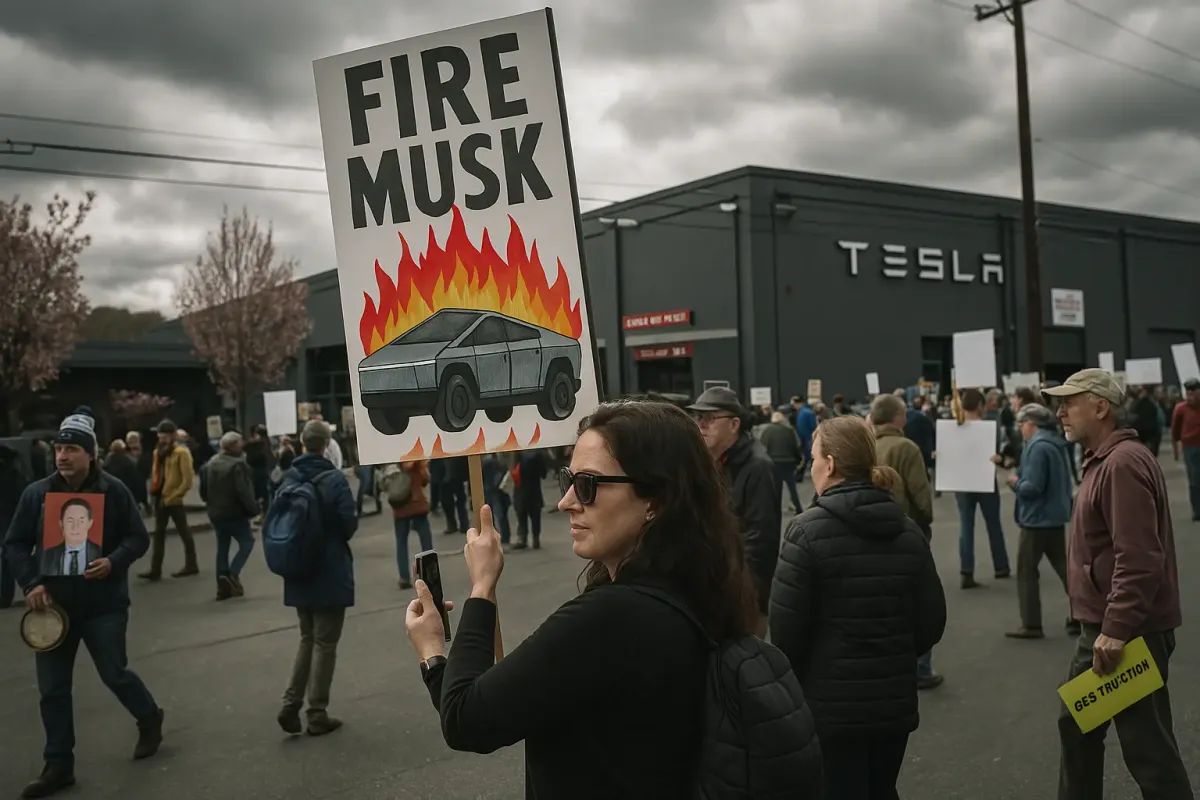A Stand for Respect: Why Private Property Should Never Be a Political Target
Discover the far-reaching consequences of vandalism during protests, its impact on community trust, and the importance of peaceful activism for meaningful change.

An in-depth look at how vandalizing private property during protests damages community trust, disrupts the economy, and undermines the livelihoods of everyday people. This piece explores why such acts should remain outside the realm of politics and offers constructive alternatives for enacting change.
In recent months, a series of incidents involving protests against Elon Musk have escalated well beyond peaceful demonstration. Tesla vehicles have been vandalized, dealerships have been obstructed, and everyday car owners have found themselves caught in the crossfire of misplaced outrage. It is completely valid for people to voice their concerns about leadership, technology, wealth disparity, or any social issue affecting their communities. However, when these concerns become a catalyst for property damage, we cross a line that has serious economic, social, and even cultural implications.

Although high-profile figures like Musk tend to attract criticism on a global scale, such actions don’t only affect the wealthy. Vandalizing cars or blocking dealerships has a very tangible ripple effect on local economies, from independent car rental hosts who depend on their vehicles to businesses that rely on the automotive supply chain. Even if the target appears to be a single billionaire, the impact spreads to working families, local employees, small business owners, and many others who contribute to the economic fabric of our society.
This blog post takes a closer look at the broader implications of protest turning into vandalism, and why it’s important to maintain a clear boundary between justified discontent and unjustifiable destruction. In a capitalist society driven by innovation, respect for private property is not just a legal matter; it’s also a moral stance that upholds individual rights and fosters ongoing progress. By exploring the real victims, the economic consequences, and more constructive paths forward, we aim to show that condemning vandalism isn’t about favoring one side of a political debate. Rather, it’s a collective stand for respect, civility, and meaningful change in the face of social and economic challenges.
The Real Victims
When news breaks that a group of protesters has defaced a Tesla dealership or blocked its entrance, the initial assumption might be that the target is Elon Musk, or the broader Tesla corporation. The reality, however, is that the damage and disruption often hurt individuals who have no direct connection to the figure being protested. Imagine a Tesla owner who uses their car to commute to work, transport family members, or engage in a car-sharing venture such as Turo. These individuals might still be making payments on their vehicle, or they may have poured their savings into a single large purchase that they believed would last them for years.
When protestors slash tires, spray paint vehicles, or impede business operations at a dealership, it’s not simply a “billionaire’s problem.” It becomes a working parent’s problem when the car they rely on is suddenly inoperable. It becomes a small business owner’s problem when a rental car is taken out of service, losing valuable income and potentially jeopardizing the viability of their enterprise. Property damage affects insurance rates, repairs, and the overall sense of security in the area. Even bystanders and neighborhoods can feel the impact, especially when local law enforcement or emergency services have to divert resources to deal with vandalism and crowd control.
Additionally, these acts can harm the reputation of activists genuinely trying to address social or economic issues. When messages are overshadowed by pictures of broken windows and damaged vehicles, the real conversations about systemic problems get drowned out. Instead of focusing on potential solutions, the public and media attention shifts to images of chaos and destruction, leading many to dismiss the protest outright. This cycle helps no one, particularly those who may have otherwise been receptive to constructive dialogue.
Why This Must Stay Non-Political
It’s tempting to view vandalism as a purely political act, especially when the target is a polarizing figure like Elon Musk. But the principle at stake respect for private property transcends political ideology. Whether someone leans left, right, or somewhere in between, the right to own property without fear of destruction remains one of the foundational pillars of modern society. By labeling vandalism as a political move, we legitimize a dangerous method of discourse that can spiral out of control. People might assume that if they strongly disagree with another side, it becomes acceptable to damage or destroy property associated with that viewpoint. That’s a slippery slope.
Furthermore, when protesters make property damage a tactic, it can backfire by alienating potential allies. People who might be sympathetic to concerns about corporate influence, social justice, or environmental issues could be turned off when they see the methods employed to communicate these messages. Vandalism is a destructive force that rarely, if ever, produces the desired outcome. Instead, it fosters division, animosity, and fear. Rather than opening avenues for meaningful conversation or collaboration, these actions harden defensive stances and create further polarization.
In a society rooted in capitalist values, attacking private property can also be interpreted as an assault on personal freedom and economic liberty. While this interpretation might not capture the intent behind every demonstration, the perception itself influences public opinion. If the headline reads “Protesters destroy vehicles at Tesla dealership,” many readers will associate the protest with lawlessness rather than with valid grievances. This can result in a lack of empathy for the protest’s original cause, further marginalizing the people who sought to draw attention to a particular issue.
The Economic Angle
A society’s economy thrives when its citizens can conduct business safely and predictably. Entrepreneurs, small business owners, and large corporations all invest significant capital when they purchase or lease property whether it’s a storefront, factory, or vehicle fleet. When protesters damage cars, block roads, or disrupt dealerships, the financial consequences can be widespread.
Consider a local Turo host who might own a small fleet of vehicles, including a Tesla. In many areas, Turo hosts rely on consistent bookings to cover monthly payments, insurance fees, and maintenance costs. If their vehicle is vandalized and out of commission, they lose potential income. If this happens repeatedly or affects multiple hosts, the broader community loses out on tourism dollars and related economic benefits as travelers look elsewhere for rental options.
The ripple effect doesn’t stop there. Repair costs go up, insurance premiums spike, and local businesses might hesitate to invest in areas perceived as unsafe. When a protest turns chaotic, it may even discourage future development or expansion in the region. Large scale corporations typically have the resources to absorb some losses, but smaller entities are hit harder. This could mean laying off employees, delaying paychecks, or even closing down entirely if the cost of damages becomes unmanageable.
Moreover, damaging property in the name of protest has a chilling effect on innovation. Entrepreneurs who might want to experiment with new technologies could be wary if they see that their investments might become targets of vandalism due to polarizing public opinions. Innovation often requires risk-taking, and if the potential for property damage becomes another layer of risk, it could stifle groundbreaking ideas and slow economic progress. At a time when many communities are striving to rebound from global economic challenges, the last thing we need is another hurdle to business growth.
Better Ways to Make a Point
Protests and demonstrations have long been vehicles for social change, and they can be incredibly effective when executed peacefully and with clear messaging. Dr. Martin Luther King Jr. famously embraced nonviolent civil disobedience to highlight systemic injustices, capturing the world’s attention without resorting to destruction. The core takeaway from such movements is that legitimate grievances can be heard most clearly when the method of protest aligns with the sincerity of the message.
Engaging in vandalism muddies that message. It hands critics the opportunity to dismiss the entire movement, painting it as irrational or violent. Rather than focusing on the issues whether they’re about corporate accountability, environmental concerns, or income inequality outsiders and media outlets fixate on the damage done. This shift in narrative hinders the effectiveness of protests to catalyze meaningful dialogue or policy changes.
If a group truly believes in its cause, then finding constructive ways to demonstrate is not only morally sound, but also a more impactful strategy. Sit-ins, boycotts, workshops, community outreach programs, and public forums are all proven methods for rallying support without harming local businesses or individuals. By directing energy into building coalitions and inviting conversation, activists can recruit broader support everything from local policymakers to neighbors who may initially be skeptical. When a message is delivered peacefully and compellingly, it’s far more difficult to ignore.
Solidarity Through Positive Action
Real progress is often the product of cooperation, empathy, and focused effort. Instead of pouring resources into damaging property, people could use that time to organize donation drives, volunteer in local communities, or meet with legislators to propose changes. Constructive actions create tangible benefits, demonstrate goodwill, and show the public that the group’s main interest lies in bettering society rather than tearing it down.
Property destruction also poses ethical questions. Even if a protest group believes they are targeting a billionaire or a large corporation, countless individuals in supporting roles end up losing out local mechanics, rental hosts, middle managers, janitorial staff, and more. By contrast, community-minded actions help those same individuals. When activists decide to clean up a park, help at a food bank, or sponsor an educational workshop, they build social capital and community spirit. It’s through these acts that a movement can gain genuine allies and shift public sentiment in favor of its cause.
We live in a time when trust in institutions can feel strained. By turning to violent measures, protesters risk further eroding that trust. Instead, activists can rally around constructive efforts that not only highlight issues but also offer real, tangible assistance to the communities in need. Building homes, organizing job fairs, or assisting victims of natural disasters might sound separate from the initial cause, but these actions create a sense of unity and demonstrate that protests aren’t just about making noise they’re about contributing to solutions.
Conclusion
Condemning vandalism should not be misread as choosing sides in a political debate; it’s about upholding a principle that benefits everyone. Whether you admire Elon Musk or question his motives is irrelevant when it comes to the disruption of everyday lives. We must all live and operate within a system that respects private property, incentivizes innovation, and encourages stable economic activity. When that respect is undermined, so is the foundation of our communities and the livelihoods of countless individuals.
Many problems warrant our attention and demand change—income inequality, corporate ethics, and environmental stewardship, to name a few. Yet resorting to vandalism in the name of these causes rarely advances the conversation. Rather, it often silences it, shifting focus away from constructive dialogue and onto the aftermath of property damage. If we genuinely want a more equitable, progressive society, we need to employ methods that unite rather than divide, build rather than destroy, and enlighten rather than intimidate.
In the end, the path to meaningful change lies in robust, respectful engagement.
Let’s find practical, community-driven solutions that foster genuine conversations and deliver real results. If we disagree with a particular figure or business practice, we can challenge it through the legal, democratic avenues available. Share your thoughts on how communities can stand up for their beliefs without resorting to vandalism or intimidation. What local initiatives can we support that will foster growth and mutual understanding? How can we encourage open dialogue that leads to policy adjustments or corporate accountability? The answers lie not in shattered glass or blocked doorways, but in the ideas and actions that bring us together rather than tear us apart.
By redirecting our energy into solidarity and constructive efforts, we can protect the jobs, businesses, and innovations that drive our economy forward while still holding influential figures accountable. In a nation that celebrates both freedom of expression and the right to own property, it’s our collective responsibility to ensure that protests remain a tool for improvement, not destruction.





